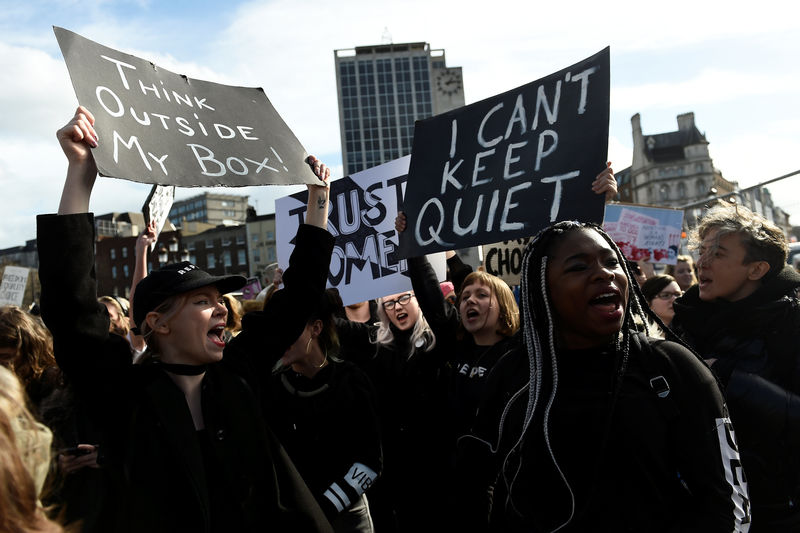By Padraic Halpin
DUBLIN (Reuters) - Protesters calling for a repeal of Ireland's strict abortion laws brought traffic in Dublin's city center to a standstill as supporters across the country were encouraged to strike, skip lectures and march on their lunch break on Wednesday.
Rules on terminating a pregnancy in once stridently Catholic Ireland are among the world's most restrictive and thousands of Irish women travel abroad, mostly to England, for abortions each year. A referendum on widening access could be held if a citizens' assembly set up by the government recommends it in a decision expected next month.
Some 2,000 activists seeking the abolition of the eighth amendment of the constitution, which enshrines an equal right to life of the mother and her unborn child, blocked Dublin's O'Connell bridge on the main thoroughfare of the capital.
Pictures on social media showed hundreds more marching in cities and university campuses around the country in protests timed to coincide with International Women's Day celebrations.
"I would like to have the right to autonomy over my own body," said Grainne O'Sullivan, a pregnant 38-year-old graphic designer who closed her studio to join the Strike 4 Repeal protest in Dublin.
"It's a disgrace in today's age that Ireland doesn't have that, that women still have to march, have to strike to let people know that they deserve to make choices. Women in pain shouldn't have to get on an airplane to go to a different country to solve the problems in Ireland."
Cat Little, a 38-year-old animator who also took the day off work, said she wanted to have a third child without the health risk she said the constitutional amendment places her under.
More protesters, some dressed in black like many in the main march in Dublin, also gathered outside the Irish Embassy in London, photographs on social media showed.
If a referendum is recommended by the citizens' assembly -- which consists of 99 randomly selected members of the public -- a vote would then be needed in parliament to set one up, potentially paving the way for a plebiscite in 2018.
Abortion has been a divisive issue for decades in Ireland.
At present, terminations are allowed only if a mother's life is in danger, after a complete ban was lifted in 2013 following large street protests by people on both sides of the debate.
Anti-abortion supporters demand no further changes to the law, to safeguard all life.

"The reality is that this is not a strike, this is a stunt," Niamh Uí Bhriain, a spokeswoman for the Life Institute, an anti-abortion group, said in a statement.